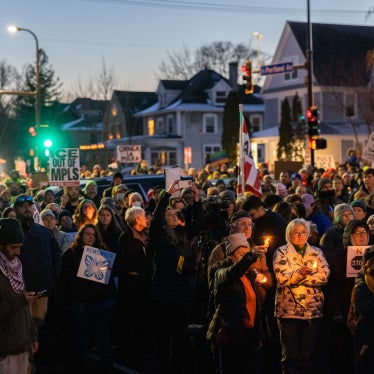(Budapest) – Hungarian police should immediately revoke their decision to refuse planners of the 2012 Pride March permission to pursue their chosen route, Human Rights Watch said today. The march should be allowed to go ahead as planned on July 7. The police also have an obligation to facilitate the peaceful passage of the Pride March, protect the safety of the participants, and ensure that anti-gay protesters are not allowed to disrupt or interfere with the march, Human Rights Watch said.
On April 6, the Budapest police department refused permission for the Pride March – a celebration of lesbian, gay, bisexual and transgender (LGBT) culture – to hold their event along their chosen route, stating that it would be impossible to redirect traffic. The route is one of the most commonly used for marches in Budapest. On January 21, government supporters held a Peace March for Hungary along the same route.
“Traffic hasn’t stopped other marches from going ahead on the same route,” said Lydia Gall, Eastern Europe and Balkans researcher at Human Rights Watch. “This is a flimsy pretext to stop LGBT people from exercising the same rights as everyone else.”
The organizers, the Rainbow Mission Foundation, had announced that the march would take place along a route starting at City Park and going to Alkotmany Street along Andrassy Avenue, a major thoroughfare. The organizers and a local human rights organization have appealed the police decision to the Budapest Metropolitan Court.
This is not the first time Hungarian police have tried to interfere with the Pride March. In 2011, when the Rainbow Mission Foundation requested an extension to the planned march route, which already included Andrassy Avenue, Budapest police denied their request, stating that the extended route would unduly obstruct traffic. A court overturned the police decision.
In 2008, Budapest police had denied a permit for a gay pride march on similar grounds but withdrew its objections following a letter from 15 LGBT organizations and Gabor Demszky, the Budapest mayor at the time.
Increasing restrictions on human rights in Hungary over the past two years have had detrimental effects on many people, including the LGBT community. For example, the new constitution, which entered into force on January 1, excludes from the definition of “family,” people in same-sex relationships.
The 2012 Pride March aims to highlight the diversity of the LGBT community in Hungary as part of the Budapest Pride Film and Cultural Festival,whose stated objective is to raise awareness about discrimination faced by LGBT and “queer” people.
The right to freedom of assembly is enshrined in Article 11 of the European Convention on Human Rights. In cases against Poland and Russia in previous years, the European Court of Human Rights ruled unanimously that banning a LGBT pride parade violated the right to freedom of assembly and association.
In 2010, the Committee of Ministers of the Council of Europe adopted a set of recommendations – CM/Rec (2010)4 – on measures to combat discrimination on the grounds of sexual orientation or gender identity. The recommendations oblige Council of Europe member states, of which Hungary is one, “to protect and ensure the respect of lesbian, gay, bisexual and transgender persons who wish to assemble and express themselves, even if their views are unpopular or not shared by the majority of the population.”
The Council of Europe recommendations further specify that “local authorities, the courts, the police and national human rights structures, including ombudspersons thus have a duty to protect the right to freedom of expression and peaceful assembly also of lesbian, gay, bisexual and transgender persons and organisations defending such persons’ rights.”
“Banning the Pride March would only worsen the social marginalization of the already vulnerable LGBT community in Hungary,” Gall said. “Instead of perpetuating discrimination, Hungary’s authorities should take an active stance on behalf of one of the most vulnerable groups in society and publicly denounce anti-LGBT sentiments.”






